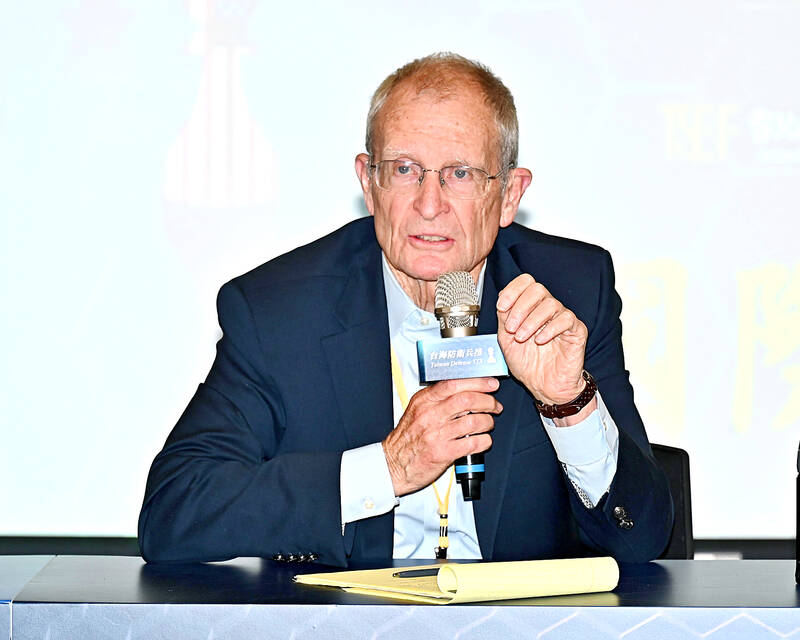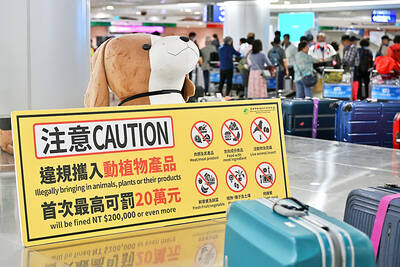If Taiwan could resist a Chinese invasion attempt for a few months, the attempt would be a “comprehensive disaster” for China, retired US admiral Dennis Blair, a former US Pacific Fleet commander, said following a civilian-organized tabletop exercise in Taipei last week.
China would assess whether Taiwan had the capability to resist for several months, knowing that if it could, an invasion would be a comprehensive disaster, Blair said in an interview, adding that it would be a “very foolish miscalculation” for China to think it could complete an invasion within a few days and present the world with a fait accompli.
Blair said that in his view, Taiwan and the US maintain a degree of deterrence, so it would be very risky for China to turn to military aggression.

Photo: Tu Chien-rong, Taipei Times
If China were to launch an unprovoked attack on Taiwan, it would pose a major challenge to the international order, so several countries, including the US, Japan, the Philippines and other nations in the Asia-Pacific region, would likely come to Taiwan’s aid in such a contingency, he said.
Taiwan should never assume that it would not receive support from the US or other countries, but it must still possess strong self-defense capabilities to buy time for others to make decisions and come to its aid, while it puts up fierce resistance, Blair said.
Asked how long Taiwan would need to hold out if China attacked, Blair said that more important than his own assessment is how China judges the situation.
If China believes Taiwan could resist for several months, it would likely take into consideration how disastrous an invasion attempt would be for it, he said.
History has seen too many nations mistakenly believe that war would be quick and easy, and that they would inevitably be victorious, only for overly optimistic judgements to result in severe national harm, Blair said.
Commenting on whether a prediction made by former US Indo-Pacific commander admiral Phillip Davidson in 2021 that China would invade Taiwan in 2027 was likely, Blair said he believes that while 2027 marks the centennial of the founding of the Chinese military, the call to be ready for an invasion by then was “more like a slogan.”
While the US and Taiwan must pay attention to the development of the Chinese People’s Liberation Army (PLA), Blair said he does not see 2027 as a “decisive moment.”
Indo-Pacific Commander Admiral Samuel Paparo also recently warned that China’s frequent military exercises near Taiwan were no longer mere drills, but rehearsals for an invasion, and said that China is “on a dangerous path.”
However, Blair cited the US Department of Defense’s China Military Power Report, which said that China is gradually expanding its military strength with the goal of becoming a world-class military power, and that 2027 is merely one stage in that process.
China is investing heavily in nuclear deterrence, space systems, aircraft carrier battle groups and long-range logistics support, and its modernization is comprehensive and not solely aimed at invading Taiwan, he said.
If there were a concrete date for an invasion, the PLA’s development patterns would look very different, he added.
He said there are three key lessons for Taiwan from Russia’s invasion of Ukraine:
First, a large, powerful neighbor does not necessarily prevail over a smaller but determined country.
Second, Ukraine’s small units combined with extensive use of drones and aerial vehicles have been able to block Russian ground forces, and even Russian air and missile superiority.
Third, Ukraine’s sinking of the Russian cruiser Moskva forced the Russian Black Sea Fleet to retreat eastward, which is an important lesson for Taiwan, as it could employ similar tactics to repel China’s amphibious ships.
If Taiwan continues to deploy autonomous uncrewed systems for near-shore and littoral operations alongside the US’ continued development of advanced weapons such as hypersonic missiles, the two countries could maintain a favorable overall military balance through 2027, he said.

UKRAINE, NVIDIA: The US leader said the subject of Russia’s war had come up ‘very strongly,’ while Jenson Huang was hoping that the conversation was good Chinese President Xi Jinping (習近平) and US President Donald Trump had differing takes following their meeting in Busan, South Korea, yesterday. Xi said that the two sides should complete follow-up work as soon as possible to deliver tangible results that would provide “peace of mind” to China, the US and the rest of the world, while Trump hailed the “great success” of the talks. The two discussed trade, including a deal to reduce tariffs slapped on China for its role in the fentanyl trade, as well as cooperation in ending the war in Ukraine, among other issues, but they did not mention

Japanese Prime Minister Sanae Takaichi yesterday lavished US President Donald Trump with praise and vows of a “golden age” of ties on his visit to Tokyo, before inking a deal with Washington aimed at securing critical minerals. Takaichi — Japan’s first female prime minister — pulled out all the stops for Trump in her opening test on the international stage and even announced that she would nominate him for a Nobel Peace Prize, the White House said. Trump has become increasingly focused on the Nobel since his return to power in January and claims to have ended several conflicts around the world,

REASSURANCE: The US said Taiwan’s interests would not be harmed during the talk and that it remains steadfast in its support for the nation, the foreign minister said US President Donald Trump on Friday said he would bring up Taiwan with Chinese President Xi Jinping (習近平) during a meeting on the sidelines of the APEC Summit in South Korea this week. “I will be talking about Taiwan [with Xi],” Trump told reporters before he departed for his trip to Asia, adding that he had “a lot of respect for Taiwan.” “We have a lot to talk about with President Xi, and he has a lot to talk about with us. I think we’ll have a good meeting,” Trump said. Taiwan has long been a contentious issue between the US and China.

Taiwan’s first African swine fever (ASF) case has been confirmed and would soon be reported to the World Organization for Animal Health (WOAH), Minister of Agriculture Chen Junne-jih (陳駿季) yesterday. The Ministry of Agriculture’s Veterinary Research Institute yesterday completed the analysis of samples collected on Tuesday from dead pigs at a hog farm in Taichung and found they were ASF-positive. Animal and Plant Health Inspection Agency Animal Quarantine Division chief Lin Nien-nung (林念農) said the result would be reported to the WOAH and Taiwan’s major trade partners would also be notified, adding that pork exports would be suspended. As of Friday, all samples